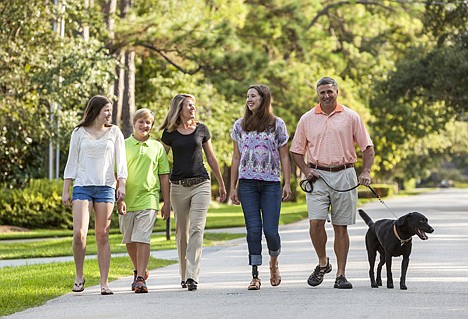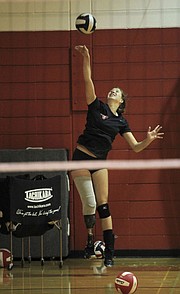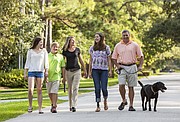Prosthesis doesn't slow prep volleyball player
HOUSTON (AP) - Athlete. Motivator. Inspiration.
Those words describe Abby Mueller, who lost part of her right leg nearly two years ago in a boating accident.
There were sad times for her family, especially Mueller's father, Rob, who was behind the wheel of the family motorboat the day of the accident.
There was guilt.
"I just wasn't in a good place for a while," Rob Mueller said.
But his daughter's can-do attitude and outside-the-box sense of humor helped bring normalcy back. A family that was already close-knit remains that way, and the Muellers' faith grew stronger.
And Abby Mueller hasn't stopped - or even slowed down.
A rising senior at Memorial High School, she has continued her athletic career, making the varsity volleyball team last year. She heads into the fall hoping to help lead the Mustangs to the playoffs for the 15th time in 16 seasons.
"What Abby has been able to do for us is just show us that there's no obstacle that you can't overcome," Memorial principal William Lakin said. "The way the world is now, when a tragic thing happens to people, there's all kinds of ways. She has just shown that, 'What do you mean something happened?'
"I think that's her attitude. Here she is, life goes on, and it's great."
Added Mustangs volleyball coach Beth Gammill: "She's inspiring. You watch her, and you're like, 'It's amazing what she's doing.'"
Mueller learned to walk again with a prosthesis. She's able to run and jump - and smack volleyballs to the gym floor.
She's been skiing and wants to go again.
She has even had the chance to represent her country.
Mueller, 17, is a member of the U.S. women's sitting volleyball team, having quickly established herself as an asset despite being its newest member. Last month, she traveled with the team to Poland for the ParaVolley World Championships, where Team USA finished second.
"If you look at the potential, she has a very high ceiling for sure," said Bill Hamiter, the national team's head coach since 2009. "She can be one of the best players on our team. We're definitely always looking for new, strong hitters, and I think she can fit in that role for sure."
Team USA swept five of six opponents before losing in five sets to defending champion China. By reaching the final, both teams qualified for the 2016 Paralympic Games in Rio de Janeiro, Brazil.
"Poland was an amazing experience," said Mueller, who had two points in a semifinal win against the Netherlands. "I had a lot of opportunities to improve my play, and every day I become more comfortable with the sport. Everyone is really encouraging, and even though I am still the rookie, they give me a lot of helpful advice, and we all help each other to be the best that we can be."
Mueller contributed to a title when Team USA won the ParaVolley Pan American Zonal Championships in October.
"I never thought in a million years that I'd be playing for the USA team," Mueller said. "It's just awesome - there's no other words to describe it. It's really cool that since something bad happened to me, I got to make the best out of it."
Rob Mueller has spent time at Kezar Lake since he was young.
The lake house in Lovell, Maine, became a regular vacation spot for his own family.
On July 10, 2012, something went wrong.
The lake level was low. The boat was in the wrong place. The children were on the wrong place on the boat.
"Just a combination of things," Rob Mueller said. "But ultimately ... I don't know how to describe it. It was unfortunate - a bad day. The worst day of my life."
Rob Mueller was steering. Abby, her siblings and cousins were on board and taking turns riding a tube behind the boat.
The boat ended up too close to a hazardous area marked by buoys and hit a submerged rock.
"If you miss a buoy, then you go into that rock field, which is not visible above the surface of the water," said Neal Wykes, a game warden for the Maine Warden Service who investigated the crash and noted there were no violations. "If you just look across the surface of the water, you wouldn't know how shallow it was."
Abby, her sister Emma and a cousin, who were all sitting on the bow, were thrown overboard.
The boat ran over Abby, and the propeller severed her right leg below the knee.
Her cousin gave up her shirt to use as a tourniquet. Abby rested on her sister, who treaded water until a second boat quickly made its way to them.
"I was just thinking, 'Stay calm and don't try to sink,'" said Emma, a sophomore at Memorial. "I was telling her to stay calm and myself to stay calm."
Heading back to shore, Abby was kept alert with conversation. She arrived on the dock, where a doctor who had a house nearby was there to help until an ambulance arrived.
"It was a lot to process," she said. "I remember seeing my sister and my cousin, and I was mainly focused on what I could do to help me get better.
"I went into survival mode."
A self-described optimist, Mueller never considered her situation's ending badly. Instead, she was thinking about what needed to happen.
The ambulance took her to an open field, from where she was helicoptered to Massachusetts General Hospital for immediate surgery. Her leg was recovered, but with the damage done to the bone and nerves, it was not reattached.
Mueller needed seven surgeries in 30 days. The family lived out of hotel and hospital rooms for a month before returning to Houston.
Life wasn't normal, but recovery was underway.
Physical therapist Kristin Beck always asks her patients what their goal is. Then she makes a point for them to understand it's their goal. Not hers.
It was right before Labor Day in 2012 when Beck began working with Mueller. The goal was simple.
Mueller wanted to play in the last volleyball game of the season, a junior varsity match Oct. 23 at home.
"So I said, 'Sure, let me get you set up,'" Beck said.
Mueller was fitted for a prosthesis about a week later, and Beck and the doctors at Texas Children's Hospital went to work.
Mueller returned to school, doing so in a wheelchair. Memorial's faculty and staff prepared itself for a bad situation. Teachers were brought up to speed. Counselors were ready to give emotional support.
It wasn't necessary. Not with Mueller.
"Not even close," Lakin said. "We were so prepared to really go out of our way to welcome her back with open arms after the tragic accident, and we didn't have to do anything. She came back just as she left in her mind with no issues.
"It was simply, 'OK, school is starting, and here I am. What's everybody looking at me like that for?'"
There were bad days. Mueller had real pain, in addition to "phantom pain" from toes no longer there.
She had to learn to walk, then build up the strength to do so for long stretches.
Mueller wasted little time with the Mustangs. Before she had her prosthetic leg, she would stabilize herself with a chair and work on her serve.
Mueller joined the junior varsity on the bench for a few games, but the stage was set for Oct. 23, 2012. Word spread, and a crowded gym awaited the Mustangs and visiting Katy, whose players and coaches were aware of the circumstances. Television cameras were there in addition to Mueller's doctors, physical therapists, friends and family.
Mueller's movement was limited, and she wasn't allowed to jump yet, but she stood up to enter as a substitution. She headed to the service line as the gym erupted.
Mueller did her part by getting the serve over the net.
"It would have been a little disappointing if I missed the serves," she said.
Added teammate Carson Pyle, who was in the game when Mueller entered: "We wanted her to do so well, and whenever she did, it was such a good feeling because she accomplished that."
Mueller scored a point from the back row, made her passes, and served match point.
"I wasn't going to miss it," Gammill said. "I remember the crowd. I remember how excited Abby was. All she did was have this big ol' smile on her face."
"Please sign my leg," Mueller says.
It's a simple request from a fan. It's just not a common one to musicians and celebrities.
But the autographs that decorate her prosthetic leg prove it works. Singer Ryan Beatty signed last summer, then tweeted out his excitement.
There's also ink from the Imagine Dragons.
"They're my favorite," she said of the indie rock band from Las Vegas, although Mueller quickly followed with another favorite (OneRepublic) that she saw in concert during the fall.
Mueller has been comfortable with what happened for a long time.
Comfortable enough to ask for autographs.
Comfortable enough not to miss an opportunity for a good joke.
"She's probably the funniest person I've ever met in my life," said Pyle, even laughing a little as she spoke. "She always has a smile. She makes me laugh all the time - just a jokester."
There was the time Gammill walked into the coaching office and saw Mueller sitting on the floor. Her prosthetic leg was off and in her hands.
"And she says, 'Look, Coach, I'm working on leg lifts,'" Gammill said.
Or when someone accidently walks too close and steps on her toes.
"They'll say, 'Oh, I'm so sorry,'" Mueller said. "But then I'll say, 'That's OK. I can't feel it.'"
The humor isn't just face to face. An account called "thefakeleg" made a run on Twitter last summer.
It's not open mic night at the Mueller residence every day, but when there's an opportunity, it's taken.
"Stumpy makes me laugh," says Emma, referring to Abby's leg.
Moments later, their mother, Valerie, takes out her phone and shows a photo of "the moose." The face is Abby's knee with eyes drawn on. The antlers are her outstretched hands.
It helped bring life back to normal.
"At first, when I was in the wheelchair, everyone would be like, 'Whoa,'" Mueller said. "The first thing they would see is me without a leg. Once people see that I'm fine with how I am and I can make jokes about it, then it's fine.
"It's not, 'Let's stare at Abby's leg.' It's, 'Let's talk, Abby.'"
The first thing that struck Hamiter about Mueller was her athleticism.
Mueller, who stands just over 6 feet, grew up playing sports. During her freshman year, she played basketball and lacrosse in addition to volleyball.
Now a one-sport athlete, Mueller joined the national women's sitting volleyball team two years ago.
The sport has been part of the Paralympic Games since 1976 and features a court measuring 10 meters by 6 meters (a court for traditional volleyball is 18 by 9). The net is 1.05 meters high for women, and at least one buttock must remain on the floor when contact is made with the ball.
Players can block serves, giving Mueller, who has the second-longest reach on the team, an advantage.
"She has a strong right arm, and she hits the ball hard. Those are definitely assets for her," Hamiter said. "She has a tall torso, which in the sitting game is a huge advantage."
The team is a mix of players born without a limb or who had an amputation because of medical reasons or accidents. Most excelled playing sports in high school. Setter Kaleo Kanahele is a senior at Edmond (Okla.) Santa Fe, where she plays volleyball.
Katie Holloway, the two-time reigning USA Volleyball Female Athlete of the Year for sitting volleyball, was born without a fibula in her right leg and had her foot and ankle amputated at 20 months. A two-sport high school standout, Holloway played Division I basketball at Cal State Northridge and earned all-conference honors all four seasons.
"I have a lot of awesome role models on the team, and they help me to improve my play every time I step on the court," Mueller said. "I am the youngest on the team, so I have a lot of time to improve."
Hamiter sees a very high ceiling for Mueller.
"It's not like throwing her into a group of so-so players and hopefully she can get in the mix," he said. "We're trying to add her to a group of ladies that have excelled in a lot of different ways - some that are the best in the world at their positions. She's in a tough environment.
"If everything goes like we think it should, she could definitely be a starter down the road. She can be one of the best players on our team."
Rob Mueller, who studied Russian in college, traveled with the national team to Moscow. The family made the trip to Poland.
"It was awesome to have them in the stands," Abby said.
Added Rob: "It's faster than you would think - the players are very agile. The players on the U.S. team in particular are very powerful, and from my perspective, the 11 girls that are on that team have faced some form of adversity in their lives. So to see them handle that well and where they are now, it's a great example for Abby. You can go do anything you want in life."
In her first season with Memorial's varsity, Mueller helped the Mustangs post a 32-9 record and reach the playoffs for the third consecutive season.
Normalcy is back, for which Mueller and her family are grateful. They lived another side, one that included countless appointments and trips in the car.
"So when you don't have anything to do now," Valerie Mueller said, "it's kind of nice."
And Abby Mueller is just being herself.
Athlete. Motivator. Inspiration.
"This is definitely an experience unlike any other," she said. "Never would I ever have imagined myself where I am now. It's amazing how a positive attitude, amazing friends and family can impact your life so much."





